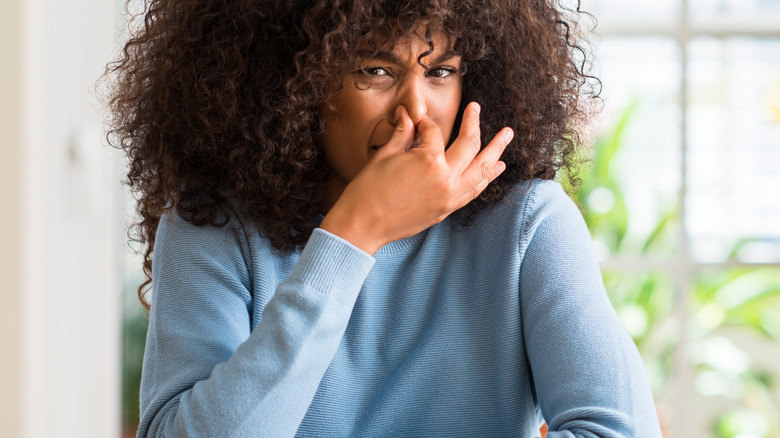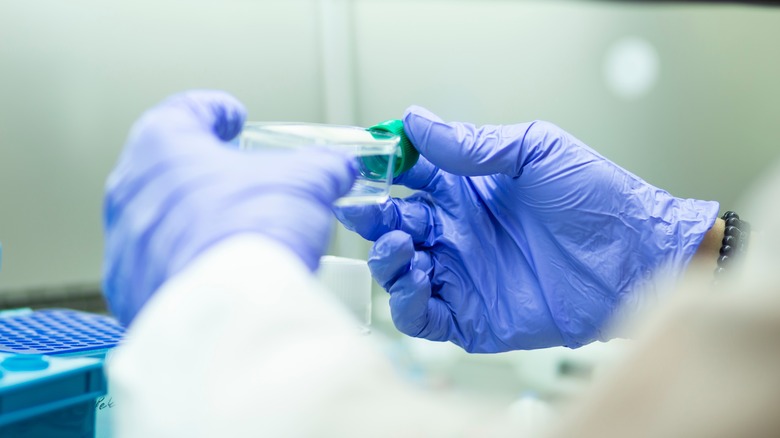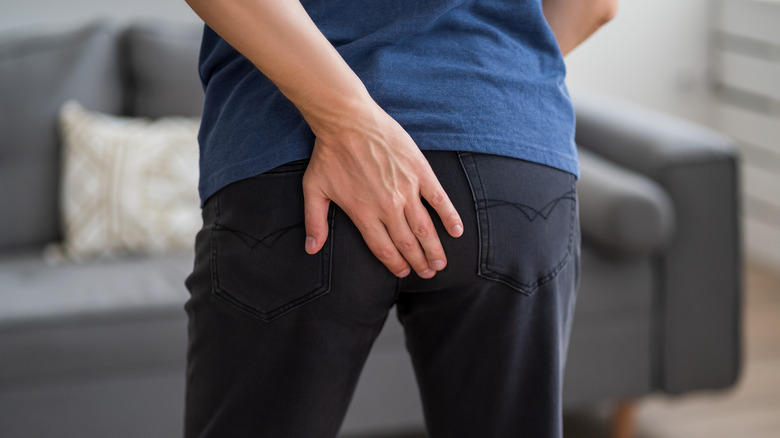Is It Healthy To Smell Your Own Farts? Here's What The Science Says
Farts have a bad rep, and it's mostly because of their smell. While there are times when the gas you pass is actually odorless, the same cannot be said for those that have the potent ability to stink up an entire room.
If you have bad gas, your face might turn red in embarrassment, and you might try sneaking out the door before anyone else notices. If it were someone else in the room who let it rip, you might actively try to clamp your nose shut and not inhale for fear of ingesting the rotten smell. But according to some researchers at the University of Exeter, smelling your own or someone else's farts could actually be healthy for you.
We fart primarily because of two reasons: food digestion and resulting gases, and when we let out excess air that we've swallowed (via Cleveland Clinic). According to a 2014 study published in Medicinal Chemistry Communications, the gas hydrogen sulfide, which gives farts their smelliness, might have the potential to combat heart disease, stroke, kidney failure, dementia, and aging (per Healthline). Here's the science behind it.
Smelly hydrogen sulfide might help protect your cells from dying
Although there is some contention on whether or not the science is referring to smelling hydrogen sulfide, the research itself looked at how that rotten egg-smelling gas can help protect diseased cells from deteriorating in animals. And it has to do with something called mitochondria, a part of cells responsible for energy production, per Healthline.
Mitochondria are what give cells power, so to speak. When we fall ill with health conditions that cause damage to cells in our arteries or veins, mitochondria produce their own hydrogen sulfide to protect the cells from dying. But when the disease progresses, this ability diminishes as well. The scientists created a mimicked version of hydrogen sulfide, which they named AP39 and exposed to the diseased cells. According to study co-author Matt Whiteman, a professor at the University of Exeter Medical School (via New York Post), "Our results indicate that if stressed cells are treated with AP39, mitochondria are protected and cells stay alive."
While news reports were quick to translate this to mean we ought to be smelling our own farts, professor of anesthesiology at the University of Texas in Galveston, Dr. Csaba Szabo, thinks otherwise (via NBC News). While not discounting the potential for artificially created hydrogen sulfide to boost cell health, he added that "none of this research says you should go and inhale farts."
Should you or should you not be smelling your farts?
While it is okay to break wind with rotten egg-smelling gas on and off, stinky flatulence might also be telling you something about your diet, any intolerances you might have, or even underlying health conditions like infections, bowel disease, and cancer. So in that respect, it is actually healthy to smell your own farts.
As for whether you should be smelling someone else's toots or your own in the hopes of boosting your cell health, it is probably too early to tell. While the 2014 study is interesting, to say the least, it goes without saying that human trials are needed before arriving at conclusions. Also, according to Dr. Csaba Szabo (via NBC News), just how much smelly hydrogen sulfide is required for cell stimulation is a complex area of study.
"Hydrogen sulfide regulates vascular function, inflammatory responses, neurotransmission in the brain, many different things," explained the professor, adding that at higher concentrations, they can actually kill cells. But this won't happen by inhaling a stinky toot, so we'll leave the decision of whether or not you're going to smell your own farts up to you. If you want to stay on top of why a high-protein diet makes your farts a little extra stinky, then go right ahead. If you don't like the smell of them, that's okay too. There's nothing wrong with pinching your nose shut.



